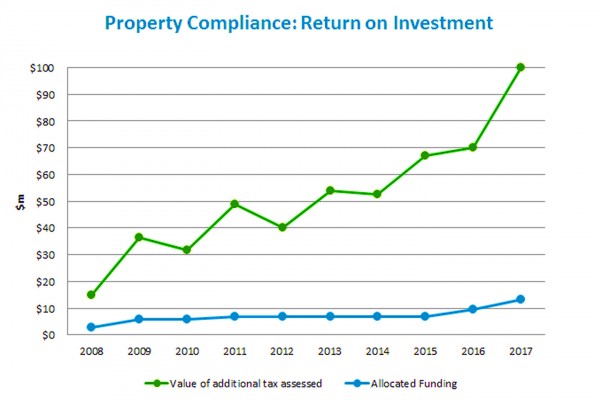Property remains the principle investment choice for many New Zealanders, with trade in residential property averaging over $40 billion a year. For this reason, Inland Revenue has an increased focus on this area to improve compliance. In 2008 a team was established to address any compliance risks with property development and speculation and associated tax obligations.
In 2015 the Government introduced new legislation and provided additional funding for Inland Revenue to put further focus on residential property speculation of $6.65 million each year for 5 years.
This amounted to an effective doubling of resources reviewing property compliance. We now have around 95 staff focusing on risks in the residential property market to make sure customers meet their obligations in relation to returning any applicable tax on property gains.
As a result, Inland Revenue has assessed additional tax owed in property transactions at over $70 million for the 2016 financial year, and for the 2017 financial year we have surpassed $100 million.

Targeting property speculators
Resources are predominantly focused on residential property speculation in the high risk markets, particularly Auckland. Speculative behaviour is often found in cases of “flipping,” where a house is bought and sold within a short timeframe for a profit as well as in off-plan sales where titles can change hands without a property even being built.
Our investigations team also monitors regions and suburbs with high property turnover so that levels of compliance risk can be identified and acted on if necessary.
Inland Revenue has a reputation in the industry for keeping a close eye on transactions and many sellers are receiving reminders about their tax obligations soon after the transaction settles.
An Auckland accountant recently commented publicly on how quickly Inland Revenue is acting to remind property purchasers of their tax obligations. He said his clients were surprised to hear from an IR staff member before they had even lodged the tax return which would have included the disclosure of their property sale.
This is because Inland Revenue has access to a list of all property transactions completed through Land Information New Zealand (LINZ). Where IR identifies a potential risk, we may contact the seller to remind them of the next steps they must take.
LINZ Data
New legislation, called the bright-line test, was introduced in 2015. This ensures any gains made on properties bought and sold within a two year period are subject to tax where applicable. A few exemptions apply.
Part of this legislation includes the requirement for all property buyers and sellers to complete a tax information statement with their New Zealand IRD number, or a tax identification number from their home country. This information is then forwarded to Inland Revenue. IR has been using property transaction data from LINZ for the past several years. This new requirement has seen a huge improvement in the data collection since October 2015.
Risk profiling
Key to the team’s success is its risk profiling approach which utilises a mix of data analysis, automated alerts and manual interventions.
Data we receive relating to property transactions and taxpayers is matched and profiled to identify any high risk transactions.
We also screen alerts based on GST returns and apply analytical rules to highlight any high risk returns. A manual intervention by staff is then undertaken: a review is carried out of the high risk transactions to decide whether closer monitoring or an audit is needed.
To date the property team identified around 22,000 property transactions where there could be speculative activity. This has resulted in more than 1,200 selected for audits and future monitoring.
Right from the start
Inland Revenue’s property compliance programme is also being supported by improved customer education. Marketing campaigns remind taxpayers of their property tax obligations and media coverage of property speculation including stories of people “flipping” houses for significant profit have helped raise awareness of tax obligations.

A property tax decision tree on the Inland Revenue website helps customers to easily work out their tax obligations.
In addition, teams around the country are actively working with property developers with outstanding returns to help them improve their current and future tax compliance. This reinforces the proactive approach based on intelligence that’s the hallmark of all compliance activity at Inland Revenue.

